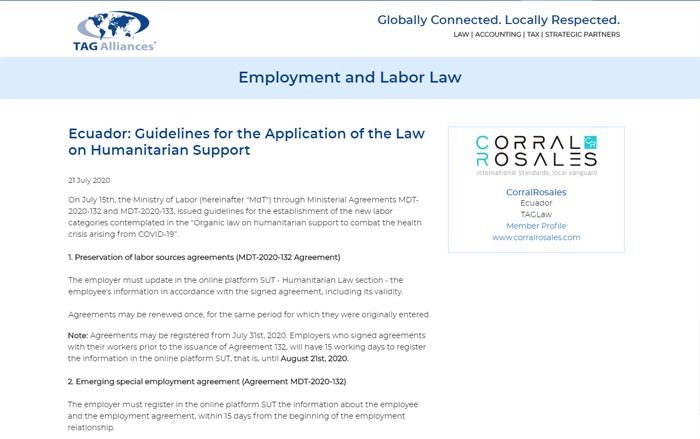Regulation NAC-DGERCGC20-00000051 issued by the General Director of the Internal Revenue Service published on the Official Registry 854 of August 5, 2020 regulates the advance payment of income tax for the year 2020, ordered by Executive Decree 1109.
1. Taxpayers required to make the advance payment:
The individuals, entities, subsidiaries, and permanent establishments of foreign entities that comply with the following conditions are required to pay the advance income tax:
- Generate taxable income, except income derived from a labor relationship.
- In the year 2019 received gross income equal to or greater than US $5,000,000.00; and,
- During the period from January to June 2020, generated profits. In the case of individuals, in order to calculate the profits, income and expenses derived from a labor relationship should not be considered.
2. Taxpayers not required to make the advance payment:
The following taxpayers are not required to pay the advance income tax:
- Micro, small, or medium size companies.
- Taxpayers that are exempt from paying income tax on the fiscal year 2020.
- Taxpayers that have registered the province of Galapagos as their tax address.
- Taxpayers that are regular exporters of goods, or that 50% of their income derives from the export of goods; or,
- Taxpayers with one of the following economic activities:
- The operation of airlines.
- The provision of accommodation and/or food services.
- Activities of the agricultural sector.
- Activities of the aquaculture sector.
3. Amount of the advance payment:
In order to calculate the advance payment, the following formula must be applied:
IR = (85% of UC * 25%) – RFIR20
Where:
IR = Advance income tax.
UC = The profit derived from the result of operations carried out from January 1 to June 30, 2020, in accordance with the financial statements and accounting and financial regulations. In order to calculate the profit, the employees profit sharing must not be deducted.
RFIR20 = Income tax withholdings made to the taxpayer from January 1st to June 30th, 2020, that the taxpayer is able to use as tax credit.
In order to calculate the advance payment, the taxpayer must issue the financial statements as of the closing of June 30, 2020.
4. Settlement the advance payment:
The settlement of the advance payment will be made through the Income Tax Advance Payment Form (form 115).
Taxpayers whose 2019 taxable income was higher than US$5,000,000.00, must file the return until August 14, 2020, even if: (i) the taxpayer does not generate an amount to be paid; or, (ii) if the taxpayer income in 2020 is considered exempt for income tax purposes.
If the taxpayer files the return once the term has expired, it would be required to pay a fine equal to 3% for each month or fraction of a month of delay. The fine will be calculated over the total of the advance tax or, over its profit if an advance payment is not generated.
The advance tax may be paid with the tax return, either in a single payment or in three installments as follows:
- The first installment on August 14, 2020;
- The second installment until September 14, 2020; and
- The third installment until October 14, 2020.
If the payment is not made within these dates, the taxpayer will be required to pay interests.
5. Tax credit:
The advance income tax will be regarded as tax credit for the payment of 2020 income tax. If the value of the advance payment is higher than the income tax generated, the taxpayer may request the reimbursement or may use the excess as credit tax for the payment of income tax for the three following fiscal years.
Do you want to receive our newsletters with information like the one you just read?
Click here and subscribe.
DISCLAIMER: The preceding text has been prepared for general information purposes only. CorralRosales is not responsible for any loss or damage caused as a result of having acted or stopped acting based on the information contained in this document. Any given situation requires the specific opinion and view of the firm in Quito / Guayaquil, Ecuador.
CORRALROSALES











